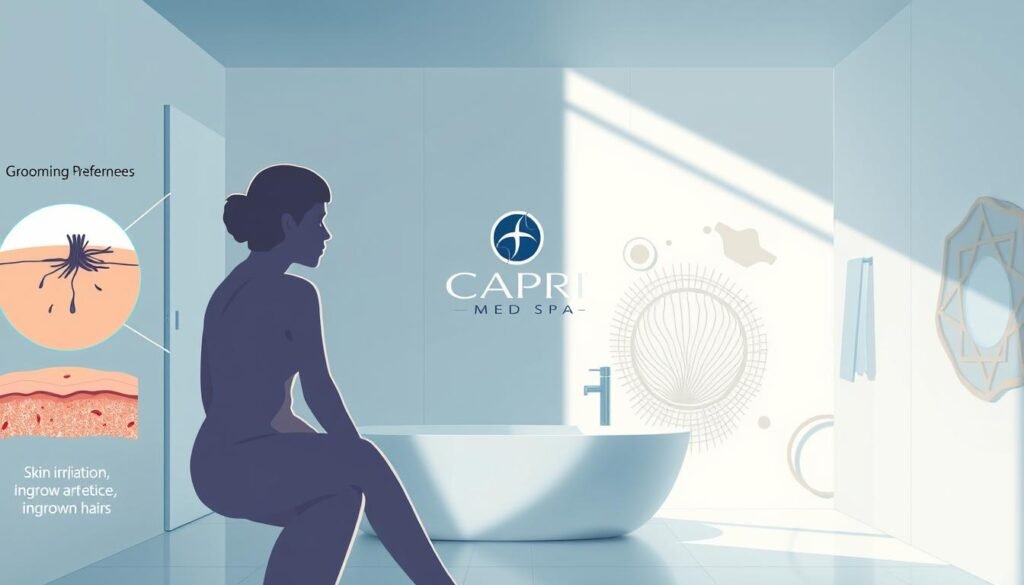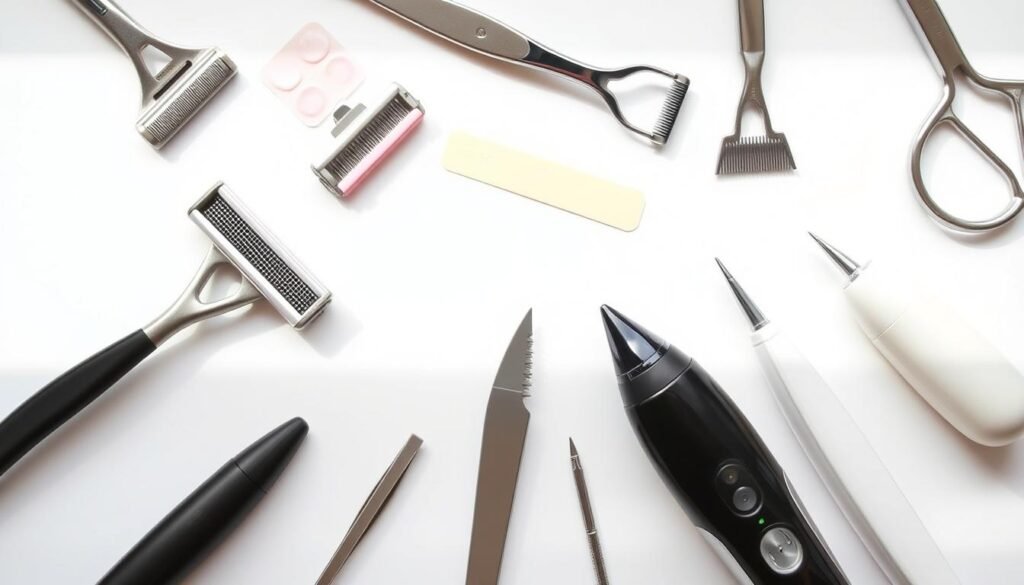Many people wonder if removing pubic hair is healthier. Almost 60% of Americans groom their pubic area for hygiene reasons. But does science back up these claims?
Pubic hair has key protective roles. It acts as a barrier against friction and keeps bacteria away. Yet, many remove it for personal, cultural, or beauty reasons.
The truth about pubic hair removal health is complex. There’s no medical need to remove it, but many do. If you’re thinking about hair removal, look for methods that reduce skin irritation and infection risk.
At Capri Med Spa, the Soprano Titanium laser offers a painless hair removal option. It uses cooling technology and has proven results, addressing common hair removal concerns.
Key Takeaways
- Pubic hair naturally protects sensitive areas by reducing friction and preventing bacterial transfer
- No medical reasons exist that require pubic hair removal
- Approximately 59% of women and 61% of men remove pubic hair believing it improves hygiene
- Trimming is considered the safest pubic hair grooming method
- Over 25% of people experience injuries from traditional pubic hair removal methods
- Advanced options like Soprano Titanium laser provide safer alternatives with fewer side effects
- Cultural differences significantly influence pubic hair grooming practices globally
Understanding Pubic Hair: Its Natural Purpose and Function
Pubic hair plays a key role in our bodies that many don’t realize. It starts growing during puberty, getting ready for reproductive life. Unlike scalp hair, pubic hair grows faster, making it coarse and curly.
The Evolutionary Role of Pubic Hair
Pubic hair acts as a sign of sexual maturity from an evolutionary standpoint. It starts growing between ages 8-14 in girls and 9-15 in boys. This hair is thicker and darker, forming a unique triangle shape. It helps trap pheromones, which might help attract mates.
How Pubic Hair Protects Sensitive Areas
Pubic hair offers many protective benefits. It acts as a barrier against bacteria, dirt, and pathogens. Studies show it can lower the risk of infections and STIs. The sebum in hair follicles fights off bacteria.
During activities and intimate moments, pubic hair reduces friction. This prevents skin irritation and small cuts.
Cultural Perspectives on Pubic Hair Throughout History
Cultures have had different views on pubic hair over time. Ancient Egyptians shaved all body hair, while medieval Japan saw it as a sign of health. Today, about 87% of American women in their teens to 40s remove some or all of their pubic hair for looks.
The first waxing salon in America opened in 1987. Yet, about 16% of women keep their pubic hair, understanding its natural role.
Is It Healthier to Remove Pubic Hair? Examining the Evidence
Many health experts debate if it’s better to remove pubic hair. Pubic hair traps sweat, oil, and bacteria, which isn’t bad if you wash well.
Studies reveal 62% of American women have removed their pubic hair at some point. Almost half did it in the last month. Most don’t do it for health reasons. Instead, 21.1% do it because of what their partners like.
The health benefits of removing pubic hair are mixed. While 83.2% of women feel cleaner, 60% face health problems. The main issues are skin abrasion (36.7%) and ingrown hairs (32.7%).
The way you remove hair is key. Razor shaving leads to 83% of grooming injuries. Only 8% use laser or electrolysis, which is safer.
| Removal Method | Usage Rate | Associated Risks |
|---|---|---|
| Shaving/Trimming | 94.3% | High (83% of injuries) |
| Hair Removal Creams | 31.7% | Moderate (chemical irritation) |
| Professional Waxing | 19.5% | Moderate (burns, irritation) |
| Laser Hair Removal | 8.0% | Low (with professional treatment) |
From a medical view, the choice to keep or remove pubic hair is personal. What’s important is picking methods that are safe for your skin.
Common Reasons People Choose to Remove Pubic Hair
People remove pubic hair for many reasons, not just health. Knowing these reasons helps us understand our grooming choices better.

Hygiene Perceptions and Reality
Many think removing hair makes their genital area cleaner. In fact, 59% of women and 61% of men do it for hygiene. Yet, science shows washing regularly is enough to stay clean.
The idea that being hairless means being cleaner is common. But, pubic hair protects our skin from irritation. While grooming is good, removing all hair isn’t needed for cleanliness.
Aesthetic and Personal Preferences
How we look is a big reason for removing pubic hair. A 2015 study found 95% of people had removed their pubic hair recently. Many feel more attractive and confident after grooming.
A 2019 study showed women who remove pubic hair feel more feminine. This choice often comes from personal comfort. Many like the smooth skin for activities or intimate moments.
Partner Preferences and Social Influences
Who we are with affects our grooming choices. Studies show 60% of men and 24% of women prefer hairless partners. One study linked pubic hair removal to happier relationships.
Media and social norms make hair removal seem normal, mainly in Western cultures. The trend has grown with more oral sex. For lasting results, treatments like laser hair removal are painless and effective.
Potential Health Benefits of Pubic Hair Removal
Removing pubic hair has many health benefits beyond looks. Studies show 76% of people groom this area often. They find it valuable.
Reduced Risk of Certain Parasites
One big benefit is less chance of getting pubic lice, or crabs. These pests need hair to live. So, removing hair stops them. A big study found grooming lowers the risk of these pests.
Easier Maintenance and Cleanliness
Removing pubic hair makes hygiene easier. It’s simpler to clean the area, like during periods or after working out. This is why many groom regularly, with shaving being the top choice at 69.3%.
Psychological Benefits and Confidence
Removing pubic hair also boosts mental health. Many feel more confident and positive about their bodies. Studies link it to better sex life, with more sensitivity and feeling.
Women often choose to remove hair for comfort, routine, and feeling sexy. Grooming choices vary by culture and personal reasons.
Possible Health Concerns Associated with Pubic Hair Removal
Many people remove their pubic hair for personal reasons. But, it’s key to know the risks. Studies show that grooming injuries are common, with 25.6% of groomers getting hurt during or after grooming.
Cuts and nicks are common, mainly with shaving. Burns and rashes also happen, often with waxing and creams. About 75% of college students get genital itching after hair removal.
Removing pubic hair can cause tiny skin tears. These make sensitive areas more likely to get infections. This includes:
- Urinary tract infections
- Vaginitis
- Yeast infections
- Folliculitis (inflamed hair follicles)
- Cellulitis (bacterial skin infection)
Between 2002-2010, about 11,704 emergency room visits were for genital grooming injuries. Those who groom often or remove all hair are more likely to get STIs. This might be because they lose a protective barrier.
Shaving is the riskiest, with many reports of razor burn and ingrown hairs. Waxing and laser treatments also have risks. But, new tech like Soprano Titanium might offer safer options. It uses advanced cooling and precise targeting.
Different Methods of Pubic Hair Removal and Their Health Impacts
Choosing the right method for removing pubic hair is important. It depends on what you value most: convenience, cost, or health. A study looked at 73,091 women and found that 93.54% groom their pubic area. They use different methods, each with its own effects.

Shaving: Quick but Temporary
Shaving is the most common choice, with 69.3% of women using it. It’s easy to do at home and doesn’t cost much. But, it has its downsides.
26.9% of those who shave face genital itching. And 10.2% get rashes. Razors can also cut the skin, making it more likely to get infections.
Waxing: Longer-Lasting Results
Waxing removes hair from the root, lasting longer than other methods. It’s effective but can be painful and cause skin irritation. About 7.2% of women get folliculitis after waxing sensitive areas.
There’s also a risk of burns if the wax is too hot. It’s important to control the wax’s temperature.
Depilatory Creams: Chemical Considerations
Depilatory creams dissolve hair without cutting it. They work faster than shaving but have harsh chemicals. These can cause allergic reactions in about 2% of women.
Symptoms range from mild irritation to severe burns on sensitive skin. It’s important to be careful when using these creams.
Laser Hair Removal: A Modern Solution
Laser treatments target hair follicles directly. They offer long-term results with fewer side effects when done by experts. Unlike other methods, laser treatments are spaced 6-8 weeks apart.
Advanced systems like Soprano Titanium at Capri Med Spa use cooling technology. This makes the process more comfortable, even in sensitive areas.
Why Laser Hair Removal Stands Out as a Healthier Option
Laser hair removal is a top choice for removing pubic hair. It’s not just about convenience. Laser hair removal gives you lasting results and is kinder to your skin over time.
Long-Term Benefits for Skin Health
Removing unwanted hair takes over 58 days on average. Laser hair removal does more than save time. It improves your skin’s texture and tone.
Unlike razors and waxing, laser treatments don’t strip your skin. They gradually reduce hair growth. This leads to less irritation and healthier skin.
Reduction in Ingrown Hairs and Irritation
Advanced laser technology makes painless hair removal possible. It greatly lowers the risk of ingrown hairs. Most people need 6-8 sessions for best results, but see less irritation after just a few.
Shaving products cost around $15.87 a month, over $10,000 in a lifetime. Waxing can cost up to $23,000. Laser hair removal saves you money and prevents razor bumps and redness.
The Science Behind Laser Technology
Laser treatment sends light into hair follicles. The pigment absorbs the light, causing heat damage. This method stops hair growth without harming nearby skin.
A single treatment can cut hair growth by up to 25%. Sessions are 4-6 weeks apart. Side effects are rare and short-lived. Modern lasers are precise, making treatments safe and comfortable.
Introducing Soprano Titanium: Revolutionary Painless Laser Hair Removal at Capri Med Spa
The Soprano Titanium laser hair removal system at Capri Med Spa is a game-changer. It’s designed for those who want to remove pubic hair effectively without feeling any pain. This technology uses multiple laser wavelengths to target hair follicles while keeping your skin cool and safe.
How Soprano Titanium’s Cooling Technology Enhances Comfort
Traditional laser treatments can be uncomfortable. But Soprano Titanium has a cooling system that keeps your skin at a comfortable temperature. It uses SHR technology to heat hair follicles gradually, making the treatment almost painless.
Why Patients Choose Soprano Titanium for Sensitive Areas
The pubic area is very sensitive. Soprano Titanium’s precision technology is perfect for this area. It works well on all skin types and hair colors, even the fine hairs other lasers miss. Patients find it causes little irritation and they recover quickly.
Expected Results and Treatment Timeline
Most people see the best results after a series of treatments, spaced 4-6 weeks apart. The Soprano Titanium system gives progressive results that get better with each session.
| Treatment Session | Expected Results |
|---|---|
| 1-2 Sessions | 15-20% reduction in hair growth |
| 3-4 Sessions | 30-60% reduction in hair growth |
| 5-6 Sessions | 70-90% reduction in hair growth |
| Maintenance | 1-2 sessions yearly for sustained results |
Capri Med Spa technicians make treatment plans just for you, based on your hair type and density. Treatments for the pubic area usually take less than 30 minutes. You might see some mild redness that goes away in a few hours, so you can get back to your day right away.
How to Care for Your Skin Before and After Pubic Hair Removal
Proper skin care is key before and after pubic hair removal. Gently exfoliate the area a few days before. This removes dead skin cells for better hair removal.
After the treatment, cleanse the area gently. Avoid harsh soaps and scrubbing. A soothing moisturizer can reduce redness or irritation.
It’s also important to stay out of direct sun. The treated skin may be more sensitive. By following these steps, you can keep your skin healthy and avoid side effects.
FAQ
What is the natural purpose and function of pubic hair?
Pubic hair has important roles in humans. It signals when someone is ready to have children. It also helps in spreading pheromones.
It acts as a shield against friction and catches harmful germs. This helps keep the genital area moist and healthy.
Is removing pubic hair inherently healthier than keeping it?
There’s no clear proof that removing pubic hair is healthier. It might cut down on some parasites. But, it also takes away its protective benefits.
Choosing to remove pubic hair should be based on personal reasons, not myths.
What are some common reasons people choose to remove pubic hair?
People remove pubic hair for many reasons. They might think it’s cleaner, want a different look, or feel more comfortable. Or, they might do it because of what others think.
It’s key to make this choice based on what you want, not what others say.
What are the health benefits of pubic hair removal?
Removing pubic hair might lower the risk of some parasites. It could also make cleaning easier for some. It might even boost confidence.
But, the proof for these benefits is not strong. Keeping the area clean is always important, with or without hair.
What are the health risks and concerns associated with pubic hair removal?
Removing pubic hair can lead to cuts, burns, and skin problems. It can also cause infections. The risks vary based on how you remove it and how well you do it.
How do different pubic hair removal methods compare in terms of effectiveness, duration, cost, and health impacts?
Shaving is quick but can irritate the skin. Waxing lasts longer but might hurt. Chemical methods can irritate, and laser hair removal is safer and more effective.
Why is laser hair removal considered a healthier option for pubic hair removal?
Laser hair removal is better for the skin. It reduces irritation and other skin problems. It’s safer and leaves the skin smooth and healthy.
What makes Soprano Titanium laser hair removal stand out at Capri Med Spa?
The Soprano Titanium at Capri Med Spa uses cool technology. This makes the treatment comfortable, even in sensitive areas. It works well for all skin types and hair colors.


